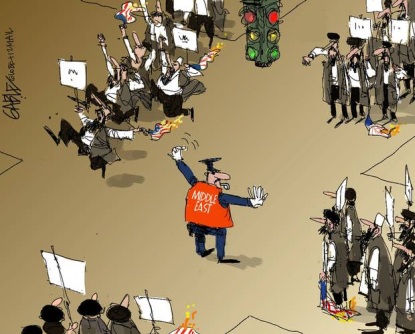
Globe
& Mail, Canada
[Click
Here for More Cartoons]
'Military
Option' Poses Threat to Global Economy (Handelsblatt,
Germany)
"The next few months threaten to be dangerous. Several severe regional economic and political crises could combine into a mega-crisis, which would in turn create very serious global shockwaves ... The drums of war in the Middle East are pounding louder. ... If such forecasts come to pass, there will be no limited 'surgical strike,' but the beginning of two wars: an air war led by the U.S. and Israel, and an asymmetrical war led by Iran and its allies."
-- Former German Defense Minister Joschka Fischer
By Dietmar Neurer

Translated By Claire Parsons
September 15, 2012
Handelsblatt - Germany - Original Article (German)
Berlin: Joschka Fischer is no
economist, but the former German Foreign Minister’s recent assessment of the
Middle East was not far off the mark. Especially considering that when his
views were published, it wasn’t yet known that an Islamophobic U.S.-made film
would lead to a wave of violence in the Arab world.
“The next few months threaten to be dangerous. Several severe
regional economic and political crises could combine into a mega-crisis, which would
in turn create very serious global shockwaves,” wrote Fischer. “The drums of
war in the Middle East are pounding ever louder.”
Posted
by Worldmeets.US
Fischer referred to the crises over Syria and Iran, and the
fact that around the world, there is talk of a "military option." If
such forecasts come to pass, there will be no limited “surgical strike,” but
the beginning of two wars: an air war led by the U.S. and Israel, and one that
will be asymmetrical led by Iran and its allies. Fischer warned that under
these circumstances, the "effects would be far reaching." Such a war
in the Persian Gulf, the “petrol station of the global economy,” would impact
oil exports, and prices would go through the roof.
A Timeline of Islamist Attacks on U.S. Facilities
Abroad
-- August 7, 1998: In
simultaneous attacks on embassies in the Kenyan capital Nairobi and Tanzanian
capital Darussalam, 230 people died and thousands were injured. Osama bin Laden
was behind the attacks.
-- October 12, 2000: During
an attack on the U.S. Navy destroyer USS
Cole, 17 soldiers and two terrorists were killed and 39 people injured at
the Yemen Port of Aden. A terror group allied with Osama bin Laden were
responsible.
-- June 14, 2002: A car bomb
exploded in front of the U.S. Consulate in Karachi, Pakistan. Twelve Pakistanis
died. In February, a gunman shot three Pakistani police in front of the Consulate.
-- October 15, 2003: A bomb
attack on U.S. citizens in the Palestinian Territories at the Eres border crossing killed three U.S. Embassy security
officials in Israel.
-- May 26, 2004: A police
officer was killed in a double car bomb explosion in front of the
Pakistani-American Cultural Center in Karachi, Pakistan.
-- December 6, 2004: During
an attack on the U.S. Consulate in Jeddah, Saudi Arabia, five Consulate workers
and four assailants were killed. Al-Qaeda claimed responsibility.
-- March 18, 2008: A Yemeni
security guard was assassinated in the U.S. Embassy in Sana’a. Following the
attack, many Embassy officials were withdrawn.
-- July 9, 2008: Three
Turkish police officers and three out of four attackers were killed outside of
the U.S. Consulate in Istanbul during a gun battle; the men were affiliated
with al-Qaeda.
-- March 4, 2011: A
Kosovo-Albanian shot a group of U.S. soldiers on a bus at Frankfurt am Main
airport. Two Americans were killed, two more were seriously injured. He was
said to be an extremist working alone, his motive; revenge for U.S. attacks on
Muslims.
-- September 12-13, 2012: In
response to a blasphemous video insulting to the Prophet Muhammad, Muslims storm
U.S.-Embassies in several countries. Four Americans were killed during an
attack on the consulate in Bengazi, Libya; the ambassador was among the dead.
Egyptian demonstrators attacked the Embassy in Cairo. The following day in
Yemen, several hundred demonstrators attacked the U.S. representative in
Sana’a. Three assailants died in the onslaught.
Fischer’s concerns are now shared by leading German
economists, as the situation has become increasingly dangerous. Following Friday
prayers in several Muslim countries, there have been protests against the United
States and Israel. In the Sudanese capital Khartoum, demonstrators attacked the
German and British embassies.
Near the U.S. Embassy in the Egyptian capital Cairo, police used
tear gas against stone-throwing demonstrators near the U.S. Embassy. In Yemen,
security forces fired warning shots and used water cannons to keep protestors
away from the U.S. Embassy building. Similarly, in Iran, Bangladesh and
Indonesia, large numbers of protesters hit the streets. The occasion: the U.S.-
produced film about the Prophet Muhammad.
Many economists have expressed the view that a further
escalation could have a massive impact on a sensitive world economy. “The global
economy is vulnerable to geopolitical shock,” chief economist at Dekabank, Ulrich Kater, told Handelsblatt. “At
a time when many economists are trying to deal with domestic debt problems, economic
confidence remains low.”
Particularly after significant economic crises, the economy is
left vulnerable. “Negative influences (when the economy is weak) can cause far greater
damage than during more robust times.” Kater said. A
“precipitous rise” in oil prices along with an ailing economy in many
industrial countries can hit hard.
Further Uncertainty Thanks to Euro-Debt
Crisis
Commerzbank chief
economist Jörg Krämer
admits to concern regarding a possible military conflict between Israel and
Iran.
“Beyond the loss of human life inherent to war, it would
also put great strain on the economy,” Krämer told Handelsblatt.
However, Krämer also said that the situation in the
Middle East isn't the source of the stress that the global economy has been
suffering for some time now. “More important is the uncertainty posed by
the sovereign debt crisis in the euro area.” he added. Looming massive government
bond purchases by the European Central Bank were indeed meant to lessen the
risk of averting the disintegration of monetary union and help gradually stabilize
the global economy. "But the price will be high in this respect, as the eurozone mutates into an Italian monetary union.”
SEE ALSO ON THIS:
FARS News, Iran: 'Overabundance' of Free Speech Tied to Islamophobia, Blasphemy
Kayhan, Iran: The Mahdi is Reappearing to Rid World of 'Devils in Human Form'
Le Monde, France: Lesson Unlearned: The Prophet Transcends All Films or Cartoons
Die Welt, Germany: Ahmadinejad Announces Iranian Plans to 'Administer the World'
Kayhan, Iran: Ahmadinejad: Egypt Revolution Reveals Hand of the 'Mahdi'
Grand Mufti, Egypt: 'Prophet Mohammad Endured Personal Insults without Retaliating'
DE TIJD, Belgium: Americans Mistaken to Buckle Under on Free Speech
Der Standard, Austria: For Now at Least, it's Lose-Lose for the U.S. in the Muslim World
Al Watan, Libya: If the Prophet Can be Insulted, then the Holocaust can be Questioned
Le Quotidien d’Oran, Algeria: Why Insulting the Prophet Always 'Pays Off Big'
Der Spiegel, Germany: Muslim Protests Show
Limits of Free Speech
Frankfurter Rundschau, Germany: Islam in Turmoil: Religion as 'Ersatz-Identity'
Al Watan, Libya: Libyan Fatwa Court Calls Attack on Americans an 'Offense to Islam'
The Independent, U.K.: Obama's Foreign Policy of Reconciliation Lies in 'Tatters'
Die Zeit, Germany: Romney's 'Nostalgia' Ill-Suited to Reality of Fast-Changing World
Die Tageszeitung, Germany: Muslim Unrest Raises Stakes of U.S. Election Even Higher
Independent, U.K.: 'Inside Story' of U.S.
Envoy's Assassination
Global Times, China: America is 'Disrespectful' of Other Cultures
Daily Star, Lebanon: Influential Lebanon MP
Says Israel Backed
Film to Defeat Obama
Debka File, Israel: Al-Qaeda Chief Zawahri
'Personally Ordered' Murder
of U.S. Envoy
Independent, U.K.: 'Provocateurs' East and West Know: Politics and Religion Don't Mix ’
Telegraph, U.K.: Arab Spring Turns Sour for United States
Telegraph, U.K.: Ambassador Chris
Stevens: Man of Drive, Passion
Independent, U.K.:
Fear and Loathing:
Another Unholy Row about Islam
Guardian, U.K.:
Attack in Libya Underlines
Threat of Salafi Islamists
Global Times, China: America ‘Disqualified’ as Global Human Rights Judge
Xinhua, China: Human Rights Record of the United States in 2011
Rodong Sinmun, North Korea: America by Far World’s Leading Human Rights Abuser
Yezhednevniy Zhurnal, Russia: Putin is Mistaken to Favor China Over the United States
Huanqiu, China: U.S. Should Keep its Nuclear Weapons Away from Koreas
Guardian, U.K.: It Should
Have Been Clear - Deposing
Qaddafi was the Easy Part
According to Frankfurt economic researcher Thorsten Polleit, political tensions in the Middle East in fact, “threaten
an already lackluster international economic situation.” Oil prices have
already risen considerably due to inflationary monetary policies, and further
increases could lead to “higher cost burdens on consumers and businesses, which
in turn would curb demand.” Polleit told Handelsblatt.
Gustav Horn, director of the Macroeconomic Policy Institute
(IMK) at the Hans-Böckler-Foundation,
doesn't rule out the possibility that recent instability could put the entire
global economy at risk. “To deal with the economic slowdown, the volatility of
global oil production must be sustainably reduced,” Horn told Handelsblatt. This
is not currently being seen. “It is likely that speculation on the commodities exchanges
has led markets in this direction.” The IMK director
regards rising gas Germany to be a symptom of this.
YOUR DONATION MAKES OUR WORK AS
A NON-PROFIT POSSIBLE. THANK YOU.